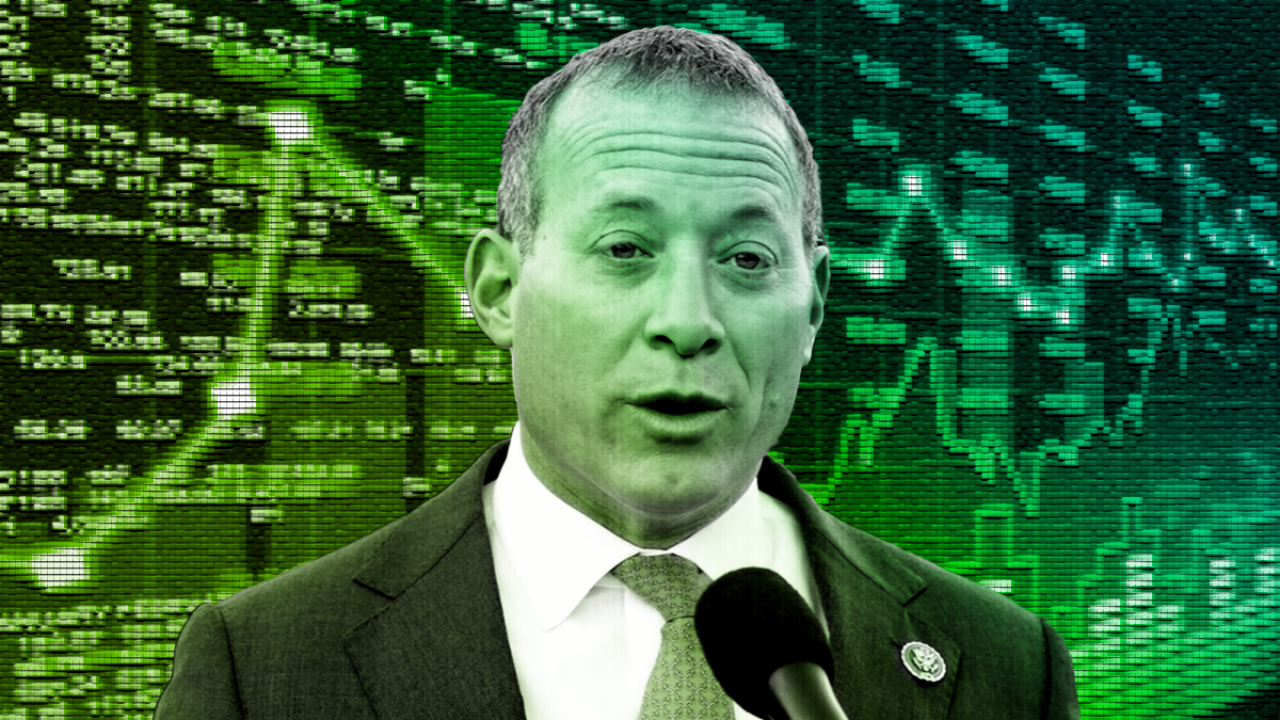Big Pharma Dems Are Standing in the Way of Lower Drug Prices
As Medicare drug-price negotiations take shape, Democrats are doing Trump's dirty work by trying to limit the number of medicines regulators can target. Rep. Josh Gottheimer, D-N.J. is one of the Democrats trying to limit regulators on Medicare drug pricing. Graphic: Truthdig. Image: Jacquelyn Martin/AP Photo
Rep. Josh Gottheimer, D-N.J. is one of the Democrats trying to limit regulators on Medicare drug pricing. Graphic: Truthdig. Image: Jacquelyn Martin/AP Photo
The following article was first reported and published by The Lever, a reader-supported investigative news outlet that holds the powerful accountable.
While President Joe Biden is using Medicare to lower the cost of a handful of overpriced drugs and wants to expand the practice to hundreds more, some of Big Pharma’s favorite Democrats are working to do the opposite.
After the pharmaceutical industry unleashed a $1.5 million bipartisan donation blitz, members of Biden’s own party have joined with Republican lawmakers to try to limit the number of drugs regulators can cut prices for in the future — an initiative Donald Trump is actively campaigning on in the lead-up to the 2024 presidential elections.
Democratic Reps. Scott Peters (Calif.), Wiley Nickel (N.C.), Josh Gottheimer (N.J.) and Donald Davis (N.C.) are each co-sponsoring at least one of several proposed bills that would limit regulators’ ability to negotiate down prices of drugs covered by the Medicare government insurance program. The legislation would erode the drug-pricing reforms included in the Democrats’ 2022 Inflation Reduction Act — efforts that Peters, Nickel, and Gottheimer supported. (Davis had not yet been elected to Congress.)
The four, who all hail from states with a major biotech or drug-industry presence, have together raked in more than $300,000 from pharmaceutical and health-products interests during the 2023-2024 congressional session. Gottheimer is reportedly eyeing a 2025 gubernatorial run in New Jersey, home to the pharmaceutical giant Merck & Co.
The four, who all hail from states with a major biotech or drug-industry presence, have together raked in more than $300,000 from pharmaceutical and health-products interests during the 2023-2024 congressional session.
The eleven Republicans signed onto the bills have received $1.2 million in total from the same industries.
One of the bills, the Optimizing Research Progress Hope and News (ORPHAN) Cures Act, would exclude critical drugs for rare diseases from these price negotiations. Two other bills, the Maintaining Investments in New Innovation (MINI) Act and the Ensuring Pathways to Innovative Cures (EPIC) Act, would delay the process for many other medications.
If these bills pass, experts worry it would degrade the power of Biden’s drug price-negotiation efforts and lead to continued price gouging for life-saving medicines.
“The price negotiations, in the grand scheme of things, will improve affordability and improve access for Medicare beneficiaries,” Jeromie Ballreich, a health economist at Johns Hopkins University, told The Lever. “[But] ultimately pharmaceutical companies recognize that price negotiation is going to reduce their prices, reduce their revenue, reduce their profit, and they are in the business of making money.”
Biden is pushing to expand provisions of the 2022 Inflation Reduction Act that targeted pharmaceutical companies’ long history of unregulated price hikes. While the current measure allows Medicare to negotiate the price of 160 drugs by 2034, Biden said in his State of the Union address that he wants regulators to increase that number to 500 drugs over the next decade. Trump, meanwhile, may try to weaken these reforms as part of his Project 2025 reelection plan to remake the executive office.
Lawmakers and their industry backers argue that the number of drugs up for price negotiation should be limited, since such interventions will lead to lower profits for industry, which in turn will stifle innovation for essential drugs. This argument is particularly prevalent in the rare-disease space, because developing these complicated drugs requires risky investments. Yet experts counter that pharmaceutical manufacturers will continue to make billions from rare-disease drugs and other medications, even after price negotiations.
Powerful pharmaceutical companies are also taking to the courts to try to block current drug price negotiations. Drugmakers including Bristol Myers Squibb and Novartis have submitted lawsuits in New Jersey arguing that existing Medicare price negotiations, which currently involve 10 popular and costly drugs, violate the First, Fifth, and Eighth Amendments of the Constitution.
Lobbying groups for the pharmaceutical and biotechnology industry spent a combined $36 million on lobbying on the Inflation Reduction Act and other matters last year, according to lobbying records. The Biotechnology Innovation Organization, a lobbying group representing the biotech industry, lobbied specifically on the ORPHAN Cures Act and MINI Act, both of which were introduced in September 2023.
Profits From Rare Diseases
To help encourage the sort of risky research and investments required for medicines that treat specific rare and intractable diseases, the Inflation Reduction Act exempted such “orphan drugs” from Medicare price negotiations — but only if the approved drug is designated to treat a single rare disease.
Makers of rare-disease drugs receive major tax incentives, fee exemptions, and exclusivity deals thanks to the Orphan Drug Act of 1983 — but a loophole in the law allows them to keep such incentives even if the drugs are then approved for additional conditions shortly thereafter.
The new ORPHAN Cures Act would amend the Inflation Reduction Act to exclude all orphan drugs from price negotiations, including those that the U.S. Food and Drug Administration (FDA) approved to treat “one or more rare diseases or conditions” — meaning those that take advantage of the Orphan Drug Act loophole.
Rep. John Joyce (R-Pa.), who introduced the bill, received a total of $94,600 from the pharmaceutical and health products industries during the 2023-2024 session, according to OpenSecrets.
Democrats Peters, Nickel, Davis, and Gottheimer are co-sponsoring the bill, alongside four Republicans.
Lobbying groups for the pharmaceutical and biotechnology industry spent a combined $36 million on lobbying on the Inflation Reduction Act and other matters last year, according to lobbying records.
Peters, who has long been considered one of Big Pharma’s favorite Democrats, received more than $133,000 from the pharmaceutical and health products industries during the 2023-2024 session, positioning him among the top 20 congressional recipients from these industries. In the 2022 election cycle, he was among the top three recipients.
In that time period, Peters spearheaded a successful effort to stop a 2021 House bill that would have allowed the federal government to negotiate some drug prices, and immediately received nearly $20,000 from pharmaceutical executives and lobbyists. His wife is president and CEO of Cameron Holdings, an investment firm that owns equity in a company that provides manufacturing and packing for pharmaceutical companies.
Peters, one of the wealthiest lawmakers in Congress, has refused to reject pharmaceutical industry donations, telling constituents, “I’m not going to unilaterally disarm and defund my campaign so that Republicans can win, I just think that’s a dumb thing to do.”
In response to a request for comment, Paul Iskajyan, Peters’ communications director, noted in an email, “Representative Peters strongly supports Medicare price negotiations; he in fact helped write the legislation included in the Inflation Reduction Act that capped prescription drug and insulin costs for seniors and allowed Medicare to negotiate prescription drug prices. Likewise, people dying from rare diseases need drugs to survive and many of those cures are being created in San Diego, which employs more than 70,000 people in life sciences.”
Peters’ Democratic co-sponsors, Nickel, Davis, and Gottheimer, received roughly $168,000 in total during the 2023-2024 session from the pharmaceutical and health products industries, according to OpenSecrets.
Davis and Gottheimer did not respond to requests for comment.
Small Molecules, Big Profits
Legislators are also trying to increase the amount of time certain drugs must be on the market before they are even considered for price negotiations. The MINI Act, introduced by Nickel and co-sponsored by Davis and Peters, would increase the timeline of these negotiations for a class of “small-molecule drugs” that use genetically targeted technology from seven to 11 years, to coincide with the timeline for biologically derived medicines like vaccines and insulin, otherwise called biologics.
Small-molecule drugs, chemically-derived medications that can easily enter cells, are used to treat a wide range of conditions from high cholesterol to allergies, and make up most drugs available on the market. In general, small-molecule drugs are considered less expensive to make and administer than biologics, hence the smaller window before regulators are allowed to start negotiating down their prices.
According to Nickel, small-molecule drugs that use genetically targeted technology to directly alter genes, often as part of rare-disease treatments, can be risky and costly, and therefore deserve the same extended timeframe as biologics before the government tries to cut their prices.
“When we incentivize innovation into one type of drug and not the other, we are hurting the potential for cures and treatments in certain areas medically,” Rep. Nickel wrote in an email to The Lever. “The drugs targeted by MINI use gene-targeting technology to treat rare diseases, and over half of those drugs are targeting pediatric or young-adult populations.”
Peters’ Democratic co-sponsors, Nickel, Davis, and Gottheimer, received roughly $168,000 in total during the 2023-2024 session from the pharmaceutical and health products industries.
Nickel’s arguments are echoed by the Pharmaceutical Research and Manufacturers of America (PhRMA), the powerful Washington drug lobby, who contend that the Inflation Reduction Act’s current drug price-negotiation provisions will “discourage the development of small-molecule medicines.” The lobbying group insists that “Companies should be able to make decisions based on patient needs and science, not on misguided government reimbursement policies.”
Nickel, who represents North Carolina’s biotech hotbed, received $41,000 from the pharmaceutical and health products industries during the 2023-2024 session, according to OpenSecrets.
When asked about these contributions, Matt Landini, Nickel’s press secretary and digital manager, responded: “As an official government office, we are prohibited from discussing political or campaign activities.”
Seven other Republicans — including Joyce, who introduced the ORPHAN Cures Act — are sponsoring the bill. Rep. Bucshon (R-Ind.), one of the co-sponsors, has long been a pharmaceutical industry favorite, receiving $174,500 from the industries over the last session, putting him at number five of all congressional recipients of pharma money.
The Biotechnology Innovation Organization spent $9 million lobbying on the MINI Act and other matters in 2023, according to lobbying records.
Another bill, the EPIC Act, introduced this January by Rep. Gregory Murphy (R-N.C.) and co-sponsored by Davis, would exempt all small-molecule drugs from price negotiations until they have been on the market for 11 years.
Murphy received almost $63,000 from the pharmaceutical and health product industries during the 2023-2024 session. Over that same time period, Davis received roughly $52,000 from these industries, including contributions from the political action committees for drug companies including Pfizer, Novo Nordisk, Bristol Myers Squibb, and Eli Lilly and Company.
Two of the EPIC Act’s other three Republican co-sponsors, Reps. Brett Guthrie (Ky.) and John Curtis (Utah), received $233,900 and $108,500, respectively, putting them both in the top 20 congressional recipients of pharma money during the 2023-2024 session.
“It Seems A Little Bit Crazy”
Drugmakers funding these legislators insist that drug price negotiations as they exist now will hinder the development of new medical cures, particularly in the rare-disease space. Some rare-disease patients and advocates agree: Khrystal Davis, whose son has Spinal Muscular Atrophy Type 1, spoke at a recent House Health Subcommittee hearing about how the Inflation Reduction Act “jeopardizes continued research, development, and funding of orphan drugs.”
This argument leans on a 2021 report from the nonpartisan Congressional Budget Office that concluded lower drug revenues would lead to “approximately 8 fewer drugs… introduced to the U.S. market over the 2020-2029 period and about 30 fewer drugs over the subsequent 10 years.” From 2013 to 2022, the Center for Drug Evaluation and Research, a branch of the FDA that regulates over-the-counter and prescription drugs, averaged 43 new drug approvals per year, or 430 per decade.
A subsequent report from the Congressional Budget Office found that reducing profits of top drugs by 15 to 25 percent would be associated with a negligible drop in the number of new drugs introduced over the next decade.
Aaron Kesselheim, professor of medicine at Harvard Medical School, says corporate interests and their congressional advocates use the threat of stifling drug innovation to hide their true incentives: defending companies’ incredibly high profit margins.
“It seems a little bit crazy to me to say that all innovation is going to cease because of the Inflation Reduction Act Medicare negotiations, when there are already really substantial incentives that exist for profit in the pharmaceutical market,” Kesselheim said.
Two of the EPIC Act’s other three Republican co-sponsors, Reps. Brett Guthrie (Ky.) and John Curtis (Utah), received $233,900 and $108,500, respectively.
Kesselheim and his colleagues found that from the time of their FDA approval to the second quarter of 2023, 16 rare-disease drugs brought in anywhere from $6.6 billion to $19.2 billion in global revenue for Big Pharma. Rare-disease medications are also becoming a huge portion of the drug market, accounting for 43 percent of new drugs approved in 2023.
Kesselheim likewise argues that small-molecule drugs, including those that use genetically targeted technology, will still deliver massive profits to their developers, even with their current shorter timeframe before regulators start negotiating down their prices.
In testimony he provided to the House Health Subcommittee on the matter last month, Kesselheim noted that these small-molecule drugs “already generate substantial revenues and delaying Medicare price negotiation will have no effect on generating incentives for the discovery and development of these drugs.” He added that the government’s definition of “genetically targeted technology” is vague, making it hard to predict which of the small molecule drugs would qualify for this exemption.
According to Kesselheim’s testimony, of the 10 current drugs currently selected for Medicare price negotiations, seven are small-molecule drugs. Global revenues for these seven medications ranged from $15 billion to $57 billion per drug in the first nine years following their FDA approval.
Kesselheim’s arguments are backed up by a 2019 analysis conducted by Ballreich at Johns Hopkins and the West Health Policy Center, a state and federal policy research organization. Ballreich and his colleagues found that “large pharmaceutical manufacturers could endure significant revenue reductions, including the reductions considered in legislative proposals, while maintaining current research investments and still achieve the highest returns of any market sector.”
Kesselheim added that it’s important to remember that drugs are only eligible for Medicare price negotiations after they have been on the market for many years, thereby giving companies plenty of time to reap the rewards and invest in new medicines. From 2022 to 2023, Medicare paid $50.5 billion for beneficiaries’ use of the 10 prescription drugs currently selected for price negotiations. This expenditure came despite the fact the government and taxpayers heavily subsidized the development of each of these drugs, shelling out $11.7 billion on crucial research.
At the same time, researchers have found that pharmaceutical companies are using far more of these profits to enrich shareholders through stock buybacks and dividends than they are on drug research and development.
Whether or not they actually need to, some drugmakers are already changing course on their development of vital medicines in order to fight drug reforms.
Last year, a Swiss pharmaceutical company said they would delay research and development for an ovarian cancer drug to reduce the amount of time the medicine is subject to price negotiations. And this past October, Alnylam Pharmaceuticals paused clinical trials of a drug for Stargardt disease, a rare eye disorder, as they “evaluate the impact of the Inflation Reduction Act.”
Your support matters…Independent journalism is under threat and overshadowed by heavily funded mainstream media.
You can help level the playing field. Become a member.
Your tax-deductible contribution keeps us digging beneath the headlines to give you thought-provoking, investigative reporting and analysis that unearths what's really happening- without compromise.
Give today to support our courageous, independent journalists.






You need to be a supporter to comment.
There are currently no responses to this article.
Be the first to respond.